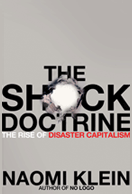The Shock Doctrine

U.S. Submits to IMF Scrutiny
David Kestenbaum, National Public Radio, September 15, 2008
"With the news of the Fannie and Freddie bailout still unfolding, former finance ministers from around the world met last week to discuss global economic stability. Some of them had a polite suggestion for the U.S., namely that a little international advice might have helped stave off the crisis....
"It's worth noting that the IMF is the world agency that countries turn to when they're in serious trouble, as Argentina has done during its recent flirtation with the brink. The IMF functions as a kind of global loan shark. Nations get money, but with a lot of strings attached. The IMF also doles out advice. A bunch of experts come to your country and conduct interviews. They look at your books and write a report.
"In practical terms, it's not a big deal. But symbolically, what [Former Finance Minister of India Yashwant] Sinha is suggesting would carry a lot of weight. Sinha says the U.S. has a history of giving advice to other countries about how to run their economies. It hasn't always been so good about listening....
"The U.S. Treasury says America has now agreed to get a stability assessment from the IMF. The announcement didn't get much attention, but officials at the IMF expect to start examining U.S. finances in the next couple months."
FEMA Under Fire for Slow Hurricane Ike Response
Carolyn Feibel and Bradley Olson, Houston Chronicle, September 15, 2008
"It didn't take long for the finger-pointing to begin. The Federal Emergency Management Agency came under fire Sunday as emergency workers were left undernourished and dozens of trucks of water and food had yet to be set up at distribution centers around Houston and surrounding communities....
"U.S. Rep. Nick Lampson, D-Houston, said he was told before the storm by FEMA officials that there was food and water already staged at the Ellington Air National Guard base. 'Now it's on the way? That doesn't make any sense to me,' he said. 'I don't know what happened ... The storm's been over for 30 hours. 'I hope some heads will roll in this,' he said later."
Industry Resisted Warning System To Prevent Train Crashes
Randal C. Archibold, New York Times, September 14, 2008
"Federal investigators said Sunday that a collision warning system they have long called for could have prevented the head-on crash here [Los Angeles] last week between a commuter train and a freight train that killed 25 people.
"The system, known as positive train control and in use sporadically in parts of the country, “would have prevented this accident,” said Kitty Higgins, a member of the National Transportation Safety Board, which is investigating the accident.
"The board has long pressed for such a system on all trains, but the industry has resisted on the grounds that it is expensive and in some cases not reliable."
Conservatives Start Pushing to Privatize Freddie Mac and Fannie Mae
David M. Abromowitz, Center for American Progress, September 9, 2008
"If one concludes that the current housing crisis results heavily from laissez-faire ideology trumping common sense protection of safety, soundness, and consumers, then the logical remedy would be to require more effective regulation....
"Yet conservatives are already pushing to 'shrink-the-GSEs,' perhaps as a precursor to fully privatize the secondary market for home mortgages....
"As [Milton] Friedman went on to note about times of crisis, oftentimes 'the politically impossible becomes the politically inevitable.' The housing market plunge appears to be just such a crisis, demanding a progressive consensus be forged soon on the road to follow."
Animal Clones's Offspring Are in U.S. Food Supply
Jane Zhang and Julie Jargon, Wall Street Journal, September 2, 2008
"Milk and meat from the offspring of cloned livestock are entering the U.S. food supply. The number of clones is on the rise, and no one is keeping track of all their offspring. In January, the Food and Drug Administration said products from cloned cattle, pigs and goats -- and their conventionally bred offspring -- are safe to eat....
"A USDA advisory panel ruled last year that clones and their offspring aren't compatible with the idea of organic foods. The USDA hasn't adopted the panel's recommendation, however, and is considering a broader ruling on livestock origin that would, among other things, address whether products from clones' offspring should be eligible for organic labels, Mr. [Bruce] Knight [USDA Undersecretary for marketing and regulatory programs] said. The USDA is unlikely to make a final decision anytime soon."
Waiting for the Bus in New Orleans
Bill Quigley, Common Dreams, August 30, 2008
"In the blazing midday sun, hot and thirsty little children walk around bags of diapers and soft suitcases piled outside a locked community center in the Lower Ninth Ward. Military police in camouflage and local police in dark blue uniforms and sunglasses sit a few feet away in their cars. Moms and grandmas sit with the children quietly. Everyone is waiting for a special city bus which will start them on their latest journey away from home....
"Soldiers with long guns and police of all types are everywhere. Fifteen hundred police are on duty and at least that many National Guard are also here. One estimate says two million people may be displaced....
"There are still big problems. A 311 call system for the disabled and seniors never properly functioned, crashed and has been abandoned."
Blackwater on Hiring Blitz Ahead of Hurricane Gustav
R. J. Hillhouse, The Spy Who Billed Me, August 29, 2008
"Blackwater Worldwide is currently seeking qualified law enforcement officers and security personnel to potentially deploy to provide security in the possible aftermath of Hurricane Gustav. This is the first time Blackwater has mobilized under its controversial Homeland Security contracts. Blackwater did deploy security personnel to assist New Orleans in wake of Hurricane Katrina and this resulted in great controversy since it was the first time a private military corporation had deployed on US soil."
See also:
Jeremy Scahill discusses Blackwater's work in New Orleans
Disaster Capitalism at the Democratic National Congress
Jeremy Scahill, Democracy Now!, August 28, 2008
Click here to watch Jeremy Scahill interview lawmakers about what they will do about Blackwater
U.S. Infrastructure Crisis Paves Path for Privatizations
Jenny Anderson, New York Times, August 26, 2008
"Cleaning up road kill and maintaining runways may not sound like cutting-edge investments. But banks and funds with big money seem to think so. Reeling from more exotic investments that imploded during the credit crisis, Kohlberg Kravis Roberts, the Carlyle Group, Goldman Sachs, Morgan Stanley and Credit Suisse are among the investors who have amassed an estimated $250 billion war chest — much of it raised in the last two years —to finance a tidal wave of infrastructure projects in the United States and overseas.
"Their strategy is gaining steam in the United States as federal, state and local governments previously wary of private funds struggle under mounting deficits that have curbed their ability to improve crumbling roads, bridges and even airports with taxpayer money.
"With politicians like Gov. Arnold Schwarzenegger of California warning of a national infrastructure crisis, public resistance to private financing may start to ease. 'Budget gaps are starting to increase the viability of public-private partnerships,' said Norman Y. Mineta, a former secretary of transportation who was recently hired by Credit Suisse as a senior adviser to such deals."
Katrina Pain Index -- 3 Years After Katrina
Bill Quigley, CommonDreams, August 24, 2008
0. Number of renters in Louisiana who have received financial assistance from the $10 billion federal post-Katrina rebuilding program Road Home Community Development Block Grant — compared to 116,708 homeowners.
0. Number of apartments currently being built to replace the 963 public housing apartments formerly occupied and now demolished at the St. Bernard Housing Development....
8,000. Fewer publicly assisted rental apartments planned for New Orleans by federal government....
12,000. Number of homeless in New Orleans even after camps of people living under the bridge has been resettled — double the pre-Katrina number....
1.9 billion. FEMA dollars scheduled to be available to metro New Orleans for Katrina damages that have not yet been delivered."















